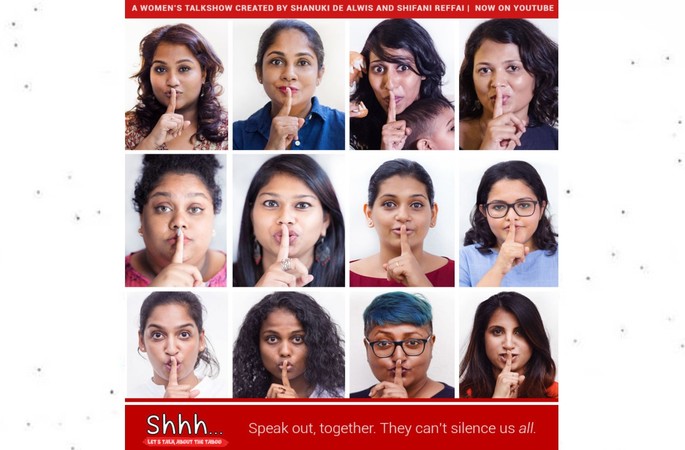Shanuki de Alwis decided to open up a talk show in a digital space where women could speak about issues that conservative societies suppressed:
‘For the longest time, I have wanted to find ways to expand the conversations beyond my immediate circles. Having been involved in advocacy work and providing psychological support to women, I found that 8 out of 10 times we struggle with the same issues and assume we are alone in our experience, whereas we’re really not. Most of our social issues exist because we just don’t talk about them to address them as a community. I have wanted to make these conversations public for a few years now’.
Shanuki collaborated with Shifani Reffai, and they decided on YouTube as the format for the show. They call the show ‘Shhh’ and have a designated email, FB group and Instagram page named: ‘Talkabout taboos’.
The guests are photographed as part of promoting the show, each with their finger over their mouth, in keeping with the idea of speaking out about topics that society often scolds or shames us into being silent about.
Shifani comments:
‘YouTube is today’s TV. A database of watchable content. And YouTube does not have that much content for women and very little for Sri Lankan women. So we’re tapping into a gap in the market and we want these episodes to be accessible to any woman anywhere with a data package on her phone.’
Shanuki adds that:
‘YouTube is the perfect tool to reach an infinite audience on zero budget, whilst also allowing us the luxury of creating content without censorship or red-tape. It also enables you to watch at your convenience, which is important for women with a million tasks to get done and no time to sit in front of a TV.’
Shifani used available social media technology on Instagram and FB and Twitter to create and promote the programme:
‘I actually enjoyed creating the promotional artwork a lot. The posts on Facebook and Instagram, this is where a lot of the engagement with viewers happens. We see their comments and real-life stories and their thank-you’s, and we just put artwork out there that will reach them and draw them in. It’s a close relationship with viewers that I don’t think would be easy to maintain if not for social media.’
Shanuki comments:
‘What we try to do is use social media platforms in two ways – the first to promote an upcoming episode with teasers and trailers and the second to have online post-episode discourse with our fans and audiences. The conversations we have on the show shouldn’t end with the episode, so we try to trigger follow-up discussions by posing questions or articles afterwards to get people sharing and thinking.’
The creators of ‘Shhh’ (a play on both their first names) are focused on building a community, not just an audience. The emphasis on collaboration and input from the listeners and viewers is not a mere marketing strategy.
Shanuki says:
‘Yes, it’s very much a community that we are attempting to build, and we’ve seen some really hopeful things come out of the show where women have connected and helped each other over shared experiences, using our platform. The show also builds itself on the feedback we receive from our audiences. However, as the creators of the show, we are also protective of its integrity and our original intent for it.’
Shanuki and Shifani balance serious topics with an intimate, engaging conversational presentation: in this first series, they have covered cyberbullying and online abuse, mental illness, the untold discomforts and challenges of pregnancy and giving birth, and the lasting impacts of child abuse.
Shanuki says :
‘When I first conceptualised this show, I never wanted it to be serious at all. My intent was to lighten society up by using more humour and bringing a different perspective to the darkness and gloom. However, the episodes take on their own character whilst being filmed and some have been quite intense. It just seemed inappropriate to make them humorous and trivialise the issues.’
The show’s impact is largely generated by the way they choose their guests.
Shifani highlights the courage and honesty of the people who come to the conversation table for the filming of each show:
‘Our guests are women who will speak openly and honestly, and who have real-life experiences to speak of on the taboo subjects we cover. It’s a little sad that we have to call it courage when a woman simply says what is on her mind. But yes, they’ve been brilliant and we are grateful that they did speak out’.
To model open conversations in different forums, the creators, film in diverse places in Colombo. Privacy and safety for these conversations were important, given the radical openness of the topics.
Maybe if we talk about taboos often enough, there will be nothing more to judge ourselves harshly on, and we’ll realise there’s nothing to hide or be ashamed of’.
Shanuki says:
‘We began by shooting at guests’ homes, but it wasn’t a practical solution to keep doing that, so I started reaching out to cafes, asking for quiet corners in exchange for promoting the space on the show. So far, we’ve been lucky in that everyone we’ve asked has been very accommodating. We look for venues that lend themselves to girl-chats and Colombo has quite a few nice intimate spaces that fit the ambience we want for the shows. It’s also a subliminal message to our audiences to take their secrets out of the home’.
They are both very happy with how this initiative is growing:
‘1,000 youtube subscribers in 3 months, 13 episodes shot in 3 months, is no easy feat. Thousands of women messaging us to share what’s been burdening them in their silence, seeing that this initiative makes their weight lighter, and sometimes even heals us as the producers, it’s rewarding,’ says Shifani.
Shanuki concurs:
‘If the show can change one life in a positive way, I’m happy. It’s not about growth for me, but about contributing to a better society, even in a small way.’
Shifani :
Equipment and manpower (or woman power!) is a challenge at times. Shanuki and I, for the most part, do it all on our own: selection, direction, shooting, editing.
Shanuki agrees:
‘We’re both super busy with our lives, so it becomes challenging to keep things going. Shifani burns more midnight oil than I do, with all the editing and producing. I’ve been burning holes in my pocket with the expenses of putting the show together. We’ve been looking for sponsors, but it’s difficult to find brands willing to associate themselves with controversial topics. I am also conscious about signing up only with sponsors who suit the integrity of the show (eg. no whitening creams or fat-burner products!) so it’s tough.’
Opening up challenging issues and speaking the unspoken is uncharted territory, but it powerfully changes society, one conversation at a time.
The creators have been praised for opening these discussions, which enable people to think differently and act with greater awareness and liberation in contemporary South Asian society, with its conservative and often frustratingly suppressive mindsets.
We hope the show will grow bigger over time, to reach women everywhere, and that we will be able to make it more sustainable with support from different groups of people who share the same vision. We hope it impacts life in Sri Lanka, makes us all less cagey about important subjects like racism, sexism, agency over your body, identity, abuse, menstruation, religion, sexuality, freedom…
Maybe if we talk about taboos often enough, there will be nothing more to judge ourselves harshly on, and we’ll realise there’s nothing to hide or be ashamed of’.
Click to have a look at Shhh Talkshow



